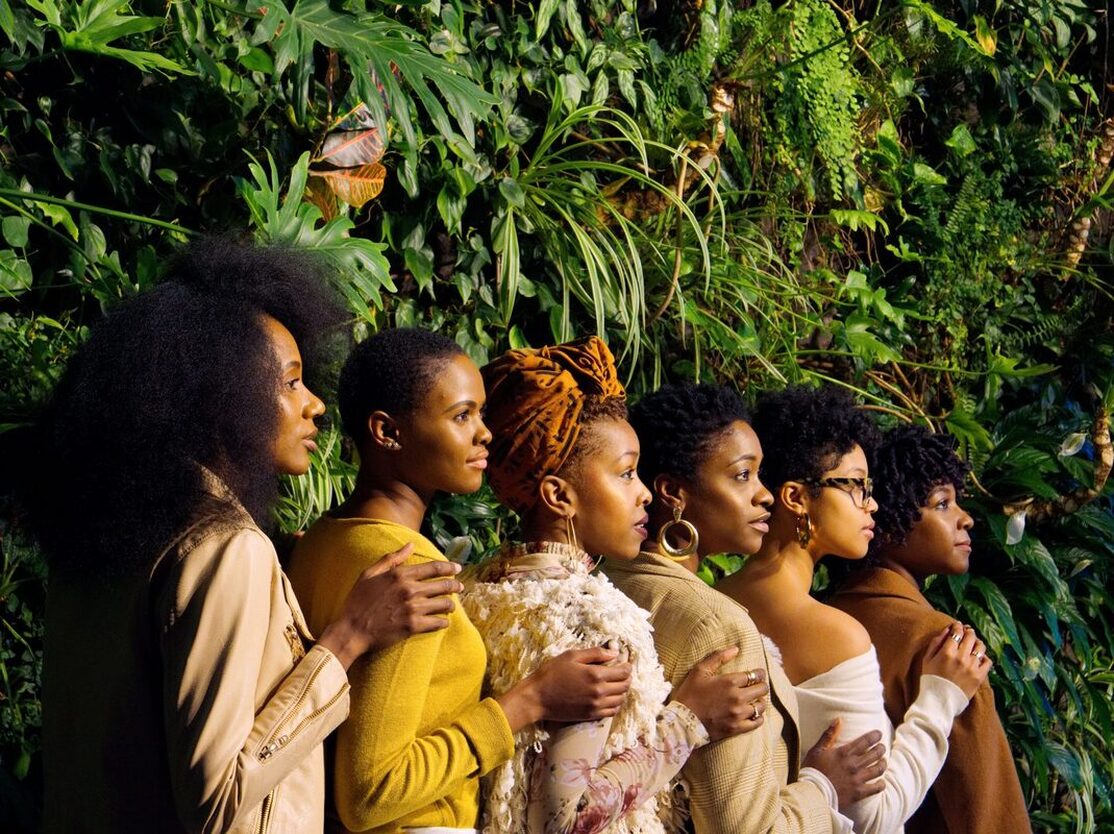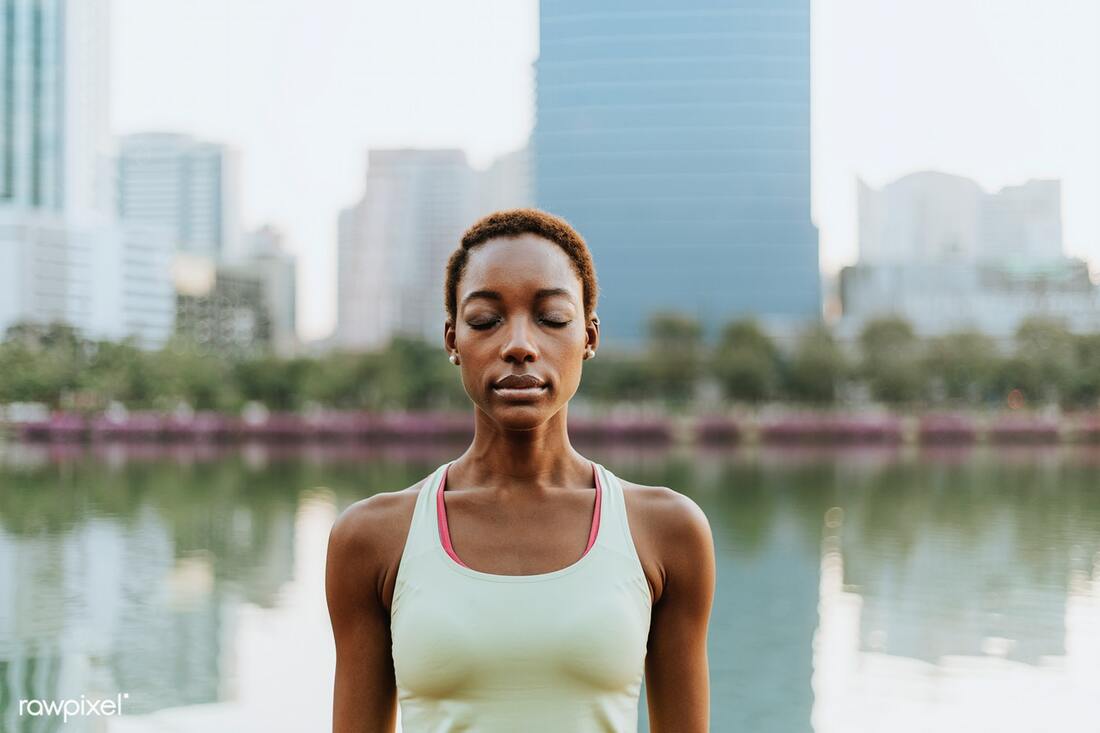|
Over the years, we have had a fantastic time providing a setting where black women can heal and practice self-love in a community with like-minded women. We're still fangirling over all of our 2019 retreats being sold out, and we're filled with gratitude to provide this unique sanctuary. We're also grateful to have a commercial for AOL (In the Know). We are continuously honored to have reached millions of people over the years. Black Women Healing Retreats is the first wellness and healing retreat for African American women and black women across the diaspora. We are here to support black women, as we are black women and want nothing but the best for our community. We are honored to have a commercial for AOL.
We give thanks for the wisdom and spirit of our ancestors.
21 Comments
written by Tanya Barnett
I knew I was exactly where I needed to be. I wished I had done it earlier. I was so happy that I came. But I was also mad. I was mad at all the people who had told me my entire life that therapy wasn’t for us. That it was for “white people.” I was mad at the stigma. I was mad that it was taboo so none of my friends knew that I was here. The only reason I was there was because of my husband. He was the one with the anger management issues and who needed the help. My agreeing to accompany him was more of a manipulation. It would get him the help he needed, and I would be able to go on about my business and hopefully a peaceful marriage. But in that therapist’s office, as I cried and released emotions I didn’t know were there, I knew it was exactly where I needed to be too. My soul was partially cleansed in a way I hadn’t experienced before. I was so relieved that I came with my husband. But more than that, I was sad that I hadn’t made that appointment years earlier. According to the US HHS Office of Minority Health, “Adult Black/African-Americans are 20 percent more likely to report serious psychological distress than adult whites.” I am a Black woman who is a wife, mother, Generation-X grandma, daughter, and so much more to so many people. But I am also human. At times, I can be strong and fearless. At other times, I feel weak, afraid, overwhelmed, anxious and even stuck. I’ve forged through life, barely taking time to breathe. Some days, I’ve wanted to run away and be by myself. Other days, I’ve wanted to curl up in a ball and just disappear. But then I am reminded that I have a family who loves me and needs me. I love and need my family even more. But I’ve been left begging, “What about me? What about my needs? Can’t you see I need a brain break?” A few years after that appointment with my husband, I found myself in a dark place. I was crying in my bed, in the car, in the bathroom at my job, and even at church. I couldn’t eat. I felt nauseous. I would get dizzy. I had no time for me because my calendar was full - all the time. I was still conducting meetings, showing up to community events and serving in church like a BOSS- what? There was no way in the world anyone could remotely tell that Sister Tanya was drowning on the inside. I legitimately had moments when I couldn’t breath. It got to a point where I couldn’t get out of bed and was calling out at work. After witnessing me call out several days, it was my husband who sat on the edge of the bed and told me I needed to get some help. He made me call the therapist to make an appointment. Talk about Black Love! When I got to that appointment, I literally laid on her sofa and sobbed. My therapist helped me see that I was dealing with so much stress and anxiety. I was afraid because we didn’t know how to tell our youngest daughter that we did not have enough money to start her freshman year of college. I also had the added stress of my oldest daughter living hundreds of miles away from me with her new baby. I could not deal with the fact that I was not there with them. I felt like an awful mother in both instances. The therapist helped me see that neither situation was my fault and that I should let my girls figure their situations out. I’m sure you are wondering why I am sharing this. Listen, I’m tired of us repeating the same behaviors at the beginning of every new year. We attend vision board parties and leave motivated to conquer the world. We scroll through countless Instagram posts with awesome inspirational quotes and pin them to our Pinterest boards. When was the last time you were intentional about seeking professional help as a way to jump start your new year? For years, I’ve had the idea of the perfect woman who’s got it all together with her fly and fabulous self. Her kids are in the junior honor society and make first-chair in the orchestra. She has a supportive partner and her bank account is overflowing with money. She is widely respected by those in her community. On the other hand, the reality is that there are some of us who have kids that are acting up in school and at home, we aren’t connecting with our partners, and we refuse to answer the phone when a number displays that we don’t recognize. Trust me, I’ve been there. I actually wrote a book about it. I totally get the frustration and dread of facing these situations. When your home life is a mess, it is hard to stay motivated. There are even some women who have everything going right for them, and they still feel overwhelmed. None of us is immune, ladies. If this is the case, why do so many of us not seek professional help? I really don’t have an answer for you, however, I can tell you why I didn’t — the taboo of therapy within my community that had been passed on generation after generation: white folks go to see “shrinks”. Therapy is not for Black people. I came from a family of God-fearing folks. I was taught that you are supposed to fast and pray and allow the Holy Spirit to heal you. This way of thinking also was taught at my church. Seeking outside help was “airing your dirty laundry”. I lived by this dogma my entire life until life spiraled out of control to the point where I needed help in order to survive. But making the choice to see a therapist wasn’t easy. Honestly, I was deathly afraid to seek help. I didn’t think I needed it because I was for lack of better words, “all good”. I thought it would be an admission that I did not have it all together. I knew my husband needed it because he had anger issues. It wasn’t until I found myself lying in my bed unable to move, breath or eat, that I knew I was in a terrible place. When I found out that two good girlfriends of mine not only saw therapists but were also on medication that their therapist prescribed, I was shocked. These sisters were professional Black women, like me. Knowing this and talking to them helped me feel a tad bit more comfortable about seeing a therapist frequently. Did you know your insurance may even cover therapy sessions? Check with your HR department about your company’s free EAP benefits. According to Psychiatry.org, Employee Assistance Programs (EAP) have been around for decades, and many companies provide them for their employees and families at no cost. An estimated 97 percent of companies with more than 5,000 employees have an EAP; 80 percent of companies with 1,001–5,000 employees have an EAP; and 75 percent of companies with 251–1,000 employees have an EAP. Yet, no more than five percent of people with access to EAPs use them. Up to 40 percent of workers are unaware of whether their workplace provides EAP and what services are available. In addition to not knowing about EAP services — reasons people do not use them include the stigma associated with mental health and substance use services and concerns about privacy and confidentiality. Honestly, getting over the stigma associated with mental health services was one of the best gifts I have given myself and my family. It saved my life. Once I learned how to use our EAP benefits, I used them, I told everyone I knew about them. Most companies give each individual who is covered by your insurance eight free sessions. Everyone in our household has been to see a therapist, including our kids. My husband regularly goes to therapy. I regularly have my sessions via tele-health(on the computer). My husband and I have also used our EAP benefit for marriage counseling. Our 19-year-old daughter used her free sessions two summers in a row transitioning from eleventh grade to twelfth grade and then to her freshman year of college. The reality is that many Black folks, especially Black women, are suffering in silence. We have to stop this insanity of pretending we have it all together. I know, because I did it. We have, for far too long, been carrying burdens we need to finally release to live and love freely. Whether it is the burden of your past, your relationships, your children, your job or even your current situation, a therapist can assist you in processing. Therapy really is a life saver if you go into it with an open mind and sincerely want improvement. I challenge you to look into using your free sessions for whatever your needs are. The sessions can be used for stress on the job, moving, having a new baby, the expansion of a business or whatever. Make sure to have this conversation with your partner, your family, and your friends. Let them know they are leaving free mental wellness services on the table every single year. Do yourself a favor this year, give yourself the gift of therapy. It just might save your life. Tanya Barnett is a published author, Tedx speaker, and veteran. written by Sherae Adwoa Moore
Disclaimer: Inner child Work and Shadow work should always be performed by a licensed therapist. Lately, I have caught myself staring into the mirror. I have been examining the person in the mirror as if I was looking at a total stranger. As if I was trying to determine if I liked the reflection staring back at me. Somehow, this person was familiar yet unknown. Now, in all fairness, I did ask her to reveal herself to me, but I didn't realize this journey would be utterly life-changing. I have yet to be the same, and that's a good thing. So far, she and I have been in this newfound relationship for a little over six months. She and I have been joined at the hip ever since and people have taken notice of my work, home, friends and family. Sis is giving me life! Our relationship isn't easy, but it's beneficial for both parties. She doesn't hide, and I am no longer afraid of my own shadow. What is the shadow? We all have shadows (or what many have referred to as our lower self or alter ego) and have become accustomed to being bag ladies. Our shadows, if left unchecked become a problem for all of us. Your shadow doesn't merely cause overcast on the sidewalk. It can cause an overcast over your daily life and has most likely been the reason why you haven't reached your highest potential or meaningful, successful relationships and careers. Our suppressed selves reveal in the most unique ways, mainly presenting themselves in others. The unappealing qualities we can't stand or criticize in others usually dwell within us. Can't stand your combative sister who always appears to be defensive? Do you avoid your coworker because she is extremely bossy? Did you say you cannot stand procrastinators or unambitious people? Or, are you convinced that most women are just jealous of you? Well, sis, it may just be you. We project many of our most hidden qualities on others, which is why it bothers us so much. Our subconscious recognizes kinfolk. The concept of the shadow isn't anything new— in fact, our ancestors in ancient Egypt (Kemet) understood the importance of polarity and the power in the merging of all components of the spirit. Our ancestors did not see a difference between magic (the unseen), science, or spirituality. All were part of the basic understanding of society. The ancient Kemites believed that the body, the Ka (life force), and the Ba (soul), and shut, swt (pronounced shoo), which is the shadow, all work in harmony to create a practical human being. Each energy in the physical world must be nurtured so that it can operate freely and efficiently. If either energy were imbalanced or not in harmony, these conflicts would manifest in the material world, which may present themselves as dysfunctional behaviors in human beings. The shadow, when in dysfunction, acts as the moon. The shadow hides the true essence of imbalance, which is typically rooted in past trauma, either emotional, physical, or mental. Our ancestors understood we are divine beings and that our energy can manipulate and control the material world around us, whether catastrophic or cosmic (positive). The ego is akin to the shadow as our biological urges are usually suppressed based on familial or society's view. Over time this develops the persona we present to the world, a mere veil. This process creates unwanted experiences that are buried and accumulated over time. The more unpleasant experiences that are not faced, the suffocating there will be. Therefore, behaviors deemed unsavory are folded neatly and locked away in our internal suitcase only to rear its existence through our opinions of others and ourselves when we really aren't looking. Our shadows make grand entrances through our coping strategies, or any bad situations we deemed as unavoidable. Let's face it— many of these situations are avoidable. We have more power than we like to admit. We have been conditioned for most of our lives to seek power outside of ourselves which leads us to rely on the blame game. It isn't Cheryl's fault you didn't get that promotion. It may have been your inability to show your worth caused by the overcast of self-doubt. Let's talk about it. How do we deconstruct the shadow? As they say, the moment we seek answers, the teacher appears. And by the teacher, I mean you. We, ourselves, must look at our past indiscretions, our relationships with people in our personal and professional lives, and analyze our connections with them. Having issues with your supervisor? Do you think she is overly critical and demanding? Dig deeper to uncover whether you formed this opinion due to your own perceived shortcoming(s). If so, where does it stem from? Or maybe you have discovered that you, too, share the very same qualities. Asking yourself these questions help shed light on your behaviors and your place in the world. Once you have proper shadow work done you don't feel the need to constantly condemn others or yourself and you are able to finally let go of baggage thats hindering you from success, whether in your career or relationships. There is no formula for shadow work. It is tailored to the individual and the baggage they carry. The only requirement is honesty and the desire to discover who you indeed are. As I was doing my shadow work, I discovered that I had the same problem with every supervisor I ever had, except for one. I wrote down in my journal all their annoying habits and our disagreements. I wrote down the environment they created and how I felt. I felt small, unappreciated, overworked, incompetent, and fake. I wrote down why I felt this way, and I concluded it was ME who co-created that environment in which I felt my worse. I went against my intuition and went to school for a degree I didn't want to get a job I didn't care for, but it paid the bills. I didn't utilize my natural talents, which always led me to feel incompetent compared to my peers. Had I not written it all down, I would have continued to blame my former supervisors for my lack of career direction and overall unhappiness because I wasn't doing something that I loved or aligned with my life's purpose. It appears so simple on paper, but the process of elimination on who fucked your life up seriously takes some steps. What happens in our external and internal environments are up to us. What our spirits emit is what we attract. What's free? Have you ever been surrounded by trees with no shade? It's a rare phenomenon if it has ever occurred. We cannot free ourselves from our shadows, but we can unify and become one. Our shadows will forever remain with us as it IS us. It takes work to be great and to stay there. It has (and still is) a process for me. It feels like an initiation into an entirely new world view. It's funny, now when I hear Badu's Bag Lady song, I instantly think of my shadow and me. My eyes cannot unsee the proverbial bag lady everywhere I go. It's like when you get a new car, and now you see it everywhere on the road. I see a sista get upset and I instantly see myself and the internal tug of war I go through. I no longer (or rarely) condemn or criticize her but am reminded of my own conflict. That's what this process does. It makes you more self-aware, always, and although reading this, you may feel like it would be too exhausting even to attempt shadow work, but just think about all the opportunities and relationships lost. Think about all the time spent in anger, jealousy, and all the negative karmic cycles. Think about the exhaustion after a full night's sleep. Think about the lack of patience and focus after endless sessions of meditation. Think about the time and opportunities gained, having shed the pounds of destructive behavior for accurate control over one's self. Think about uncovering hidden gems/talents and bounds of creativity! There is beauty in facing the pain, becoming the true alchemist and co-creator you were meant to be. Finally, as Carl Jung says, "A long process of negotiation is unavoidable." You will always feel the innate urge to suppress the shadow, but sis will strike back as she needs to breathe. She needs to be acknowledged because regardless, she, the shadow exists. This partnership is true until death do us part, but it is genuinely one we cannot afford to live without. Ase'. written by Elise Williams
As Black women, we deal with racial and gender related stressors such as racism and sexual discrimination. These stressors can affect our overall health and can increase our risk of chronic diseases. Chronic stress can affect the body’s ability to maintain homeostasis. Constant stress over time can lead to chronic health issues such as hypertension, prediabetes, and type 2 diabetes. According to various research studies, Black American women are ranked high for these chronic health issues. In addition to chronic health issues. As a result from systemic oppression, Black Americans are affected by anxiety and depression. Medical researchers are finding that the use of meditation practices can reduce stress, depression and, anxiety amongst Black American women. Meditation can help black women cope with their anxiety, as it encourages practitioners to focus on the present and let go of past and/or future events. This type of meditation enhances self-compassion and decreases absentmindedness and worry. This form of meditation can help black women cope with their anxiety. In a public health study, researchers interviewed fifteen Black American adults that experienced meditation. What the researchers found was that meditation was a great strategy for coping with stress and improving the onset of depression. Several participants stated that meditation benefited their overall health. For example, breathing exercises helped participants increase their endurance and improve posture. One participant mentioned that meditation allowed them to understand their purpose, which helped them find a sense of peacefulness and improved their quality of life. Participants also mentioned that engaging in meditation classes enhanced their social connectedness. Another study that focused on Black American women suggested that Black American women who were provided health education classes, stress education and prevention courses that incorporated meditation techniques had higher quality of life scores amongst others within their age group. In an eight-week study, 31 Black American women enrolled in meditation training to help alleviate depressive symptoms and reduce stress. After eight weeks of meditation training, researchers noticed a decrease in depressive symptoms and stress with an increase in meditation practices, such as self-acceptance and growth. I got into meditation when I first began going to therapy. My therapist recommended that I should try guided meditations to help me cope with my anxiety. I would use guided meditation apps when I could feel the onset of a really bad panic attack, but I wasn’t consistent. I started to incorporate meditation consistently into my self-care practice while I was in my 200-hour yoga teacher training. During teacher training our instructor had us participate in a few meditation workshops and practice a few guided meditation exercises on one another. After I became comfortable teaching consistent yoga classes, I began to add a small mindfulness meditation into the beginning of my yoga sequence. I like adding it to the beginning of my yoga classes because I want to give my students an opportunity to let go of their past or future stressors and become present in their yoga practice. I originally got the idea from a Black yoga teacher’s Facebook group. I wrote a post about yoga teacher burnout; I needed some advice on how to teach when I wasn’t feeling mentally present. A lot of people in the group had some really great input. One woman mentioned that she provided a Tibetan sound bowl session at the end of her class, because it was something that she actually needed. Another yoga teacher mentioned that her yoga teaching style is similar to her home practice. Based off of those women and their advice I began to provide mindfulness meditation at the beginning of class because I need a moment to become present teaching. I do this because it helps me calm my mind if I feel my anxiety begin to rise. Meditation can be a great tool for coping with stressors, depression, and anxiety. Black women should try to incorporate meditation in their self-care practice. Most yoga studios will incorporate a meditation session in their yoga class or a separate meditation class. For personal practice, there is an app called Liberate, which was created by a person of color, for people of color. Jhenè Aiko has a song called “Trigger Protection Mantra.” It’s a great track to listen to if you feel triggered by something that could cause your anxiety or depression to commence. In summary, meditation is an accessible form of relaxation for women of color because we can practice it anywhere. It is a great item to keep in our self-care tool kit. With meditation we are able to calm the mind, body, and breath, so that we can remain in the present and not worry about factors that are out of our control. written by Erika L Harper, LPC
One of the main areas that Black women are behind the eight ball is with our health. In 2019, despite decades of marketing pushes about eating healthy and working out, Black women still rank higher than women of other races for dying from various cardiovascular-related diseases. Simultaneously, we have made progress. Even though we are the most likely to be afflicted with heart disease, there are still fewer of us dying from these diseases than ever before. With that being said, we still have a lot of work to do. Black women have always been at the helm of change in this country. We have repeatedly proved ourselves to be more than capable leaders. We have been fierce change agents, and fearsome opponents, all in the face of sexism, racism, colorism, and every other –ism that Black women have to navigate through daily. We are the hub that keeps our Black culture spinning beautifully and brightly. Without us, the whole system falls apart, and, quite frankly, it’s a lot of work to keep all of the moving parts operating gracefully. However, to fulfill any of these roles, we need to be in the best possible condition physically. We need as many brilliant Black female minds so that we don’t end up repeating parts of history that we thought were tucked into the annals of the past. We must remember how essential having healthy bodies are to our social justice efforts. Black women have mastered the concept of sharpening our minds. But most people aren’t raised to understand how the physical body is connected to the mind; both should be honored equally. There are a multitude of processes that happen both in the brain and the body when we work out. Your heart rate increases, forcing your heart to circulate more oxygen to your body and mind. The constant influx of life-giving oxygen and blood causes your body to create additional blood vessels, which gives you the ability to tolerate a more massive cardiovascular load. This means that your heart won’t have to work as hard for the same amount of work. Thus we end up having exponentially more endurance to do the things that matter the most to us. Being active has also been proven to decrease the body’s stress response markedly. I’ve mentioned in previous articles; stress can be a vicious trigger for the onslaught of cardiovascular disease. The less stress and more endorphins we have in our brains means that we can be more thoughtful and mentally astute. Generally, the more muscle we have, the more efficient our bodies are at burning fat. Ideally, a plant-based diet would prove the most beneficial in supplying our bodies with the clean energy it needs to burn calories and keep us moving. If veganism isn't a practical starting point, doing simple things like removing particular processed food and sodas from our diets. And focusing on incorporating fresh vegetables and water can do wonders for firing up the body’s metabolism- especially when combined with a fitness routine. Stay away from fads or diets, which are usually highly restrictive and geared towards having you lose weight throughout short bouts of time — the same with your exercise routine. For example, If you are not a morning person, don't make going to the gym at 4 am part of your daily schedule. Maybe start with walking around your neighborhood before work or at a local track during your lunch break until you’re consistently able to make it part of your daily routine. Slow and steady wins the health race. When creating a new healthy lifestyle, you want to make sure you’re able to sustain your food and exercise regimen throughout your life. Dieting will cause your weight to fluctuate wildly, which can be demoralizing, causing you to go back to your prior eating and poor workout habits. Further, weight can drastically change with multiple rounds of extreme dieting. And binging can prove to be very damaging to our heart muscles over time leading to the very problems we’re trying to prevent. Most importantly, be gentle with yourselves. Even the most fit among us fall off the wagon from time to time. Indulge and enjoy yourself and then go back to your healthy ways of exercising and eating the next day. Also, understand that the goal here isn’t to be thin. The desire is to be healthy and strong. While losing weight is strongly associated with having a clean lifestyle, it is not necessarily an indicator of health. I know plenty of thick women who have bills of health similar to small, fit women. I also know of skinny women who have had heart attacks. So again, treat yourself with the gentleness, love, respect, and discipline that you would want for your children. You cannot lead a personal revolution from a hospital bed, Or you’re left debilitated because of some preventable health problem. Remember that the ultimate form of resistance with Black women is our very presence. So work on your melenated bodies with as much intensity as you make your mind and watch how much quicker you ascend toward the self-actualization you desire. Erika L Harper is a licensed mental health counselor, sex therapist, yoga enthusiast and writer. In her spare time she enjoys running, reading, watching movies and eating good food with her family. Connect with her on Instagram here |
KEEP UP WITH US!
SHOULD YOU HAVE ANY QUESTIONS OR ISSUES
Email Us or Call Us
Our normal business hours are 8am-4pm EST, Monday-Friday.
In the meantime, please check our FAQs for quick answers to frequently asked questions.
Customer Service Team
8AM - 4PM EST Monday - Friday
Customer Service inquiries
[email protected]
Telephone/ WhatsApp
(+506) 87694464
Press / Partnerships / Join the Team
[email protected]
~We look forward to hearing from you~
Email Us or Call Us
Our normal business hours are 8am-4pm EST, Monday-Friday.
In the meantime, please check our FAQs for quick answers to frequently asked questions.
Customer Service Team
8AM - 4PM EST Monday - Friday
Customer Service inquiries
[email protected]
Telephone/ WhatsApp
(+506) 87694464
Press / Partnerships / Join the Team
[email protected]
~We look forward to hearing from you~






